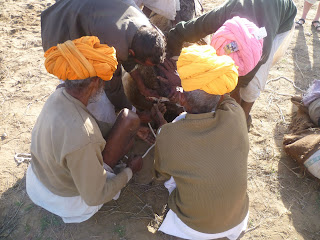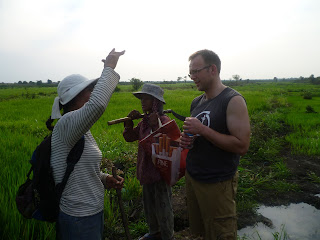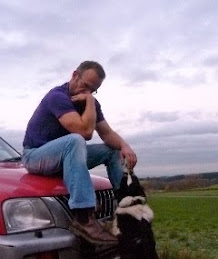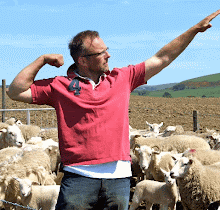Delhi airport. Its Thursday.
We have said goodbye to James. We cry longingly on each others shoulders and seek professional advice for our combined loss. Obviously I am using sarcasm to cover up the fact that this is almost true.
After taking all the responsibility for so long as group leader, organiser and Michael Blanche’s chief carer, Tony gets a well earned rest. He has been immense. We had a tipsy chat in November. I said I was going to Cambodia and India. He said he’d like to come ... thereafter he organised almost everything. If it wasn’t for him I think I’d still be at Phnom Penh airport trying to work out how the electronic doors worked.
This was the part of the trip I “organised”. This basically involved asking Ricky Thaper (treasurer and spokesman for the Poultry Federation of India) to organise things for me. We meet Ricky ... he laughs at my jokes ... what a great guy!!
We fly to Raipur, capital of the state of Chattisgarh. I sit next to an elderly man with a hat. He sings a lot. I join in when I can. He insists we contact him during our visit. I am not sure if this is a terrorist trap.
The next day we visit the ABIS group. Owned by Mr Bahadur Ali, the business had 10,000 broiler chickens in 1985. Now it turns over 2.5 million birds per cycle and there are 7 cycles per year. It has quarter of a million breeding birds. He has a 2,500 dairy cow herd and 1,500 buffalo. He has a huge feed mill. He produces pet food, fish feed and 5,000 tonnes of solvent. The milk is packed and sold under his own label. 30 veterinarians work in the business ... everyone we meet is called “doctor”. The business has a 2,500 labour force.
 |
| The Group with one of the many Doctors and Ricky in the foreground |
I’d seen vertical integration before but this seemed to also include horizontal, backwards, forwards and sideways integration too. You sensed there were no barriers in ambition or, indeed, implementation. There was no fear in growing the business. It was like going to visit the aftermath of a huge business explosion.
At the end of our day we meet the main man - Mr Bahadur Ali - he walks in and there is an aura about him. He is more comfortable speaking his native tongue ... which adds to the mystery. His questions are incisive and very focused. Weirdly, his questions are kind of answers in themselves as they seem to reveal what the important issues are on a particular subject.
He explains how he took his business from a humble beginning to one of the biggest agri-businesses in India. From 1985 to 1996 he built the business’s effectiveness. But growth was relatively slow. 1996 saw him attend the International Poultry Congress and that event seems to have transformed his whole business. His vision was radicalised ... to drive for scale and vertical integration. Thereafter, the growth graph was close to being as vertical as his integration. It rang a bell ... this was the graph a share milker in New Zealand drew me on the back of an envelope ... it was the graph a Kiwi equity partner now worth millions of dollars showed me on his computer ... the graph of an effective first generation business. Frustratingly slow growth then .... ker-bam (if that is a word) ... a steep line upwards thereafter.
The ABIS group operate - as far as I could work out - on just over 100 acres. I’ve seen intensive agricultural businesses before but this was another level. I know its not quite a true benchmark figure - they rely on other farmers for a lot of raw material and some of the enterprises are beyond agriculture - but the business’s Output ... my calculator tells me ... is over £1.5 million per acre!
 |
| The wonder of labour - everytime a calf defecated there was someone on hand to clear it up |
Mr Ali asks us about the potential for a serious sheep business in India. I suddenly get a dose of verbal Delhi belly ... my words come straight from my head through my mouth without touching the sides. I thought it would be a great idea ... introduce better genetics ... get hold of lots of land ... rely on scale ... on and on I went ... it was becoming interminable. Mr Bahadar Ali asked what stocking rates we had in the UK for sheep. 4 ewes to the acre on decent permanent pasture, up to 7 on good stuff, I said ... I was unstoppable ... I thought he would be impressed. The colleagues from ABIS looked at each other, paused and then laughed for a long time ... 4 ewes per acre versus £1.5 million turnover per acre.
Being laughed at made me think. Land in Chattisgarh would be worth around £30,000 per acre. We don’t have values like that ... yet. However, if the land price in the UK continues on its crazy path ... I’ll probably live to see the day they are. We will still only have land that supports 4 ewes to the acre. Maybe the Indians were right ... it is comical. Intensification and integration are a lot more serious. They can feed the world. Taking this theory to its logical conclusion, maybe the sheep industry has no future on any land that can be used for any other conceivable purpose. Its a cheap land enterprise and cheap land may never be again. Maybe the entire UK sheep industry will be forced to retreat to the hills ... spending the rest of its days with its begging bowl held high.





















